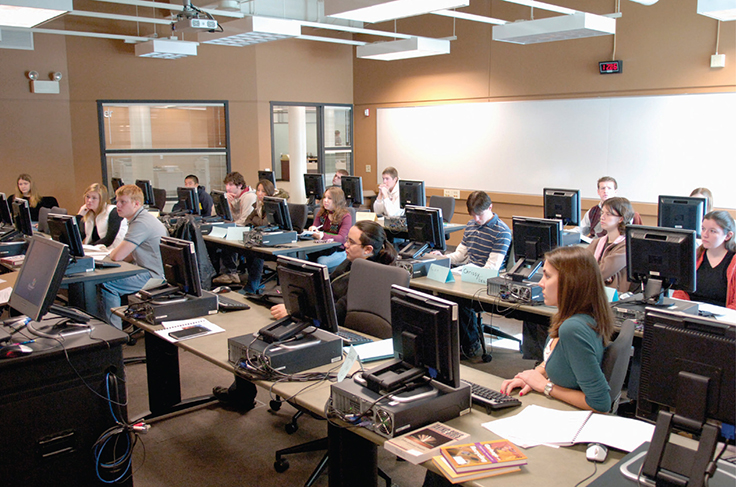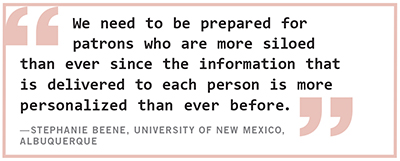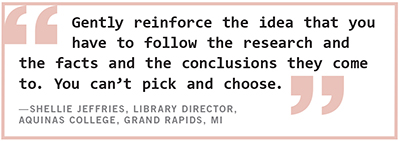In the Classroom, In Life: Academic Librarians Combat Misinformation On Campus and Off
Academic librarians have the tools to help students fight misinformation both in their studies and in their daily lives.
 Academic librarians have the tools to help students fight misinformation both in their studies and in their daily lives
Academic librarians have the tools to help students fight misinformation both in their studies and in their daily lives
Information is now, more than ever, available and shareable in an instant—but many struggle to parse reliable facts from inaccuracies, with sometimes dangerous consequences. As information professionals, librarians often find themselves on the front lines, fighting the spread of misinformation and conspiracy theories. Academic librarians are uniquely situated to connect with people who want to learn, and to shape responsible information consumers for both their classroom work and for life.
“I think we all know by now that this is a problem that is not going to go away, and, as a profession, we need to make it a priority to tackle,” says Katie Greer, associate professor and first year experience librarian at Oakland University’s Kresge Library in Michigan. “The role of evaluation as a part of the information literacy skill set is something that needs to be reexamined and recentered as a critical habit of mind.”
OVERCOMING OVERCONFIDENCE
Classroom teaching provides the most straightforward avenue for academic librarians to shape a culture of information literacy at their institutions. Shellie Jeffries, library director at Aquinas College, Grand Rapids, MI, is one of a group of librarians who teaches a required information literacy course. Jeffries says that “one of the things that we do is teach [students] tools to deal with the information they find, having them avoid confirmation bias and recognizing their implicit biases.” Jeffries emphasizes the value of teaching “lateral reading,” so that they do not rely on just one website or source, and instead dig deeper to verify what they find.
Many librarians at the undergraduate level find that new students come to college with strong technology skills and a confidence in their ability to find what they need online, but without the tools to distinguish “good” sources from “bad”—content that is inaccurate, misleadingly presented, or intentionally false. Greer notes that “because of budget cuts and testing agendas, many K–12 schools do not have a professional librarian,” something that librarians in higher education should keep in mind. Stephanie Beene, assistant professor and fine arts librarian for art, architecture, and planning at the University of New Mexico, Albuquerque, who has written with Greer about how librarians can combat conspiracy theories, says that “once we get students at the academic level, we need to assume gaps in critical thinking and analytical reasoning.... For folks that are not in instruction, we need to be prepared for patrons who are more siloed than ever since the information that is delivered to each person is more personalized than ever before.”
Christina Radisauskas, public services and outreach librarian at Aquinas College, who also teaches information literacy, has observed “overconfidence in the ability to evaluate information” among new students. Jeffries agrees that “they have this idea that they are good at finding things. They’re just really not. You can always find things—it’s finding good things” that is the key, says Jeffries. “Some of them are resistant to that idea.” Radisauskas has emphasized, in her classroom, the need to “ask questions, instead of just believing what you see, whatever is first, whatever is most convenient,” and has found that students must be taught to think critically about how they found an article and what motivation a person may have had for authoring or sharing content.
 |
DIGGING DEEPER Students learn new tools to evaluate information in Christina Radisauskas’s Information Literacy class at Aquinas College. Photo courtesy of Aquinas College |
BEYOND CRAAP
Misinformation and disinformation or “fake news,” has become a hot button topic in the media, and Radisauskas acknowledges that this can make teaching information literacy more challenging. “When we teach the idea of confirmation bias, or emotion playing a role in the kind of information you are going to believe, I try to stay away from things that are going to trigger an emotional response,” she says. “That’s very difficult when I want to use things from real life.” Jeffries notes this does not stop her from teaching about implicit bias, and has found that using more general prompts—like asking students to take the Harvard Implicit Association Test (IAT)—has prompted good and open-minded discussions.
 Most librarians who have taught information literacy will be familiar with the CRAAP test for evaluating sources—prompting students to look at Currency, Relevance, Authority, Accuracy, and Purpose. While still commonly used, there is increasing critique of the test and discussion about better ways to approach this topic. As Greer notes, with CRAAP and similar methods, “very little mental energy is expended on actually thinking through information evaluation problems. Instead, students quickly go through a checklist and assume that they have done all the work. It’s time to acknowledge that these checklists reflect a moment in time that is now gone, and…let them go.” Beene agrees that such tests “flatten out a complex world,” and encourages librarians to ask tougher questions. She tells LJ, “I suggest that we pause for a minute to think through those [sources] that create information, those that interpret information, the dynamic processes that occur throughout, and how that might be intermingled. How can we empower our students to be more ethical interpreters? More ethical creators? More ethical consumers?”
Most librarians who have taught information literacy will be familiar with the CRAAP test for evaluating sources—prompting students to look at Currency, Relevance, Authority, Accuracy, and Purpose. While still commonly used, there is increasing critique of the test and discussion about better ways to approach this topic. As Greer notes, with CRAAP and similar methods, “very little mental energy is expended on actually thinking through information evaluation problems. Instead, students quickly go through a checklist and assume that they have done all the work. It’s time to acknowledge that these checklists reflect a moment in time that is now gone, and…let them go.” Beene agrees that such tests “flatten out a complex world,” and encourages librarians to ask tougher questions. She tells LJ, “I suggest that we pause for a minute to think through those [sources] that create information, those that interpret information, the dynamic processes that occur throughout, and how that might be intermingled. How can we empower our students to be more ethical interpreters? More ethical creators? More ethical consumers?”
EVERYDAY PRACTICE
Outside of the classroom, academic librarians’ opportunities to combat misinformation may be limited. In reference interactions, says Radisauskas, students sometimes ask specifically for articles that support their thesis. In those instances, she notes, “I say, make sure you consider that there are multiple perspectives here. I build that into any reference situation I am in, when I can.” Jeffries seconds that even brief reference conversations allow her to “gently reinforce the idea that you have to follow the research and the facts and the conclusions they come to. You can’t pick and choose.”
These lessons are just as important outside the academic context, as students consume news and information in their personal lives. Jeffries aims to reinforce for students that this is “not just about academic research, it’s about what you find in your news feed,” and notes that students often “feel they don’t need to verify information when it’s personal” as they would for a research paper. While any single class or reference interaction cannot completely transform an individual’s information literacy, Radisauskas says she hopes students walk away from her class with “the desire to be able to do this better” in classes and in life.
Vincci Lui, faculty liaison and instruction librarian at the Gerstein Science Information Centre at the University of Toronto, Canada, recently created an online resource to help spot misinformation about the coronavirus and COVID-19—currently a major topic for inaccurate online news. Lui says, the “biggest challenge is that people are spreading false or misleading information just as fast as, if not faster than, the virus. This is not a new problem, but now the misinformation that’s being spread actually is being spread instantly through social media and messaging platforms.” Knowing that this misinformation has real-life and potentially harmful consequence—as people make choices that impact their own health and others’—gives a sense of urgency to librarians’ work in combatting misinformation. Because librarians understand how scientific information is produced and reviewed, Lui says, “we need to explain how much this can impact the reliability of a scientific study’s findings to our users—be they our students or the general public.”
 For librarians aiming to improve how patrons consume news in their daily lives, Lui tells LJ, it is important to “remember that people have attention spans that are shorter than ever—so you need to make it easy for them to quickly check something.” Simple and quick steps for verifying information make it more likely that people will actually be willing to assess information that they find online. Lui notes the value of “combatting misinformation right where it exists—on social media,” by creating content that can be shared on platforms like Facebook.
For librarians aiming to improve how patrons consume news in their daily lives, Lui tells LJ, it is important to “remember that people have attention spans that are shorter than ever—so you need to make it easy for them to quickly check something.” Simple and quick steps for verifying information make it more likely that people will actually be willing to assess information that they find online. Lui notes the value of “combatting misinformation right where it exists—on social media,” by creating content that can be shared on platforms like Facebook.
Knowledge is the first step toward combating misinformation and disinformation in students’ communities. “The more we understand about algorithms, social media, and Big Tech, the more we can empower users to understand how they can make better decisions about their online lives,” says Beene. Librarians can seek out information about secure internet browsers, website terms and conditions, and data privacy legislation, among other relevant topics.
The best path forward for academic librarians, especially those working as instructors, is to prompt students to think critically about the sources that they find and about themselves as information consumers. Beene notes that “allowing the time and space for the diversity of opinion to emerge is crucial” for empowering students and prompting critical dialogue.
Greer expresses optimism about librarians’ ability to change the way students approach information, telling LJ that “as much as this can seem like such a Sisyphean task, trying to lead members of our society into being better critical thinkers,” librarians “have adapted and championed new ways of thinking and doing through each and every technological innovation and information shift.” The profession, she feels, should be up to this challenge as well.
Jennifer A. Dixon is collection management librarian, Maloney Library, Fordham University School of Law, NY.
| Look for more of LJ's coverage on libraries helping to fight misinformation at What We Miss About Misinformation: Q&A with Dr. Nicole Cooke. |
RELATED
ALREADY A SUBSCRIBER? LOG IN
We are currently offering this content for free. Sign up now to activate your personal profile, where you can save articles for future viewing









Add Comment :-
Comment Policy:
Comment should not be empty !!!
Geoff Kempter
It’s good to know that our librarians are there in the front lines of this war to save us from ourselves (said the son of a reference librarian). This will take decades to fix, and we have to start teaching the next generation now. Thank you.
Posted : Mar 06, 2021 03:37